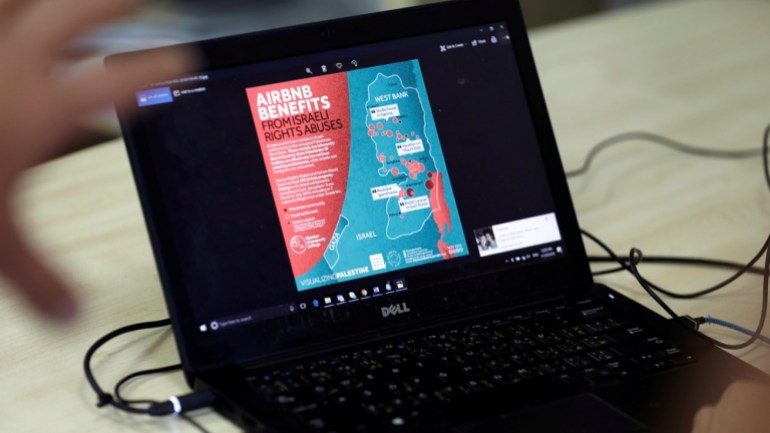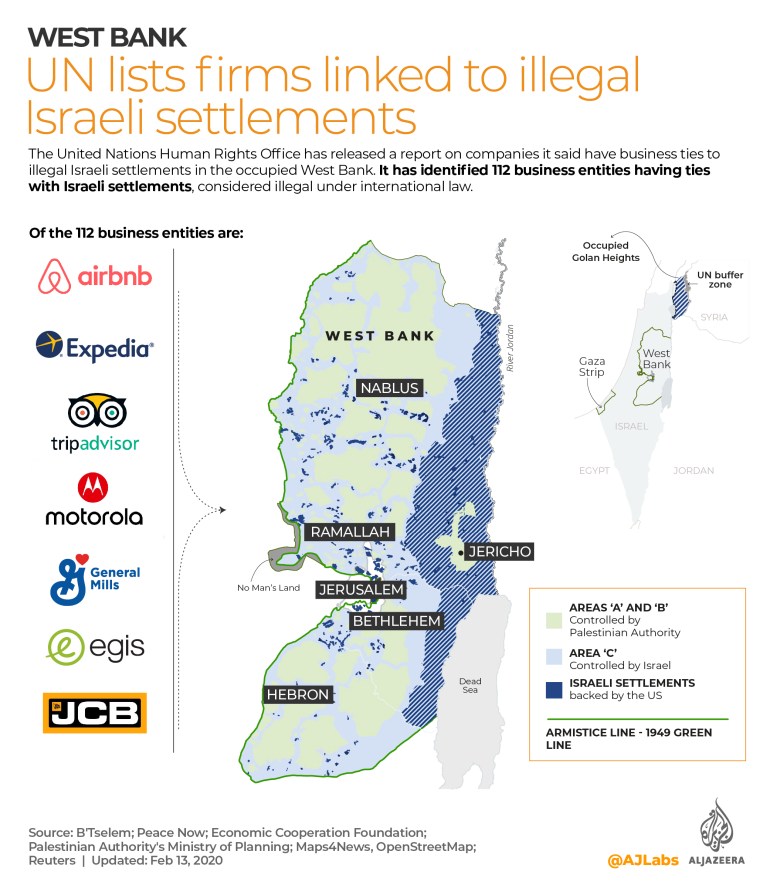Is the Booking.com reversal on Palestine corporate hypocrisy?
Travel company’s reversal of its decision to label listings as being in the occupied West Bank is evidence of how foreign companies implicate themselves in rights violations of Palestinians, analysts say.

When the online travel agency Booking.com announced last month that it was going to designate Israeli settlements in the occupied West Bank as “occupied territory” and warning of “an increased risk to safety and human rights”, it was welcomed as part of a growing international recognition that the occupation of Palestinian land should not be ignored by businesses.
But, it was perhaps not surprising when, just as has happened in the past with other companies, it backtracked on September 30.
Keep reading
list of 3 itemsUnilever decision spotlights crackdown on US Palestinian activism
Ben & Jerry’s founder: Unilever violating deal over Israel sale
Instead, after pressure from the Israeli government, the Dutch company, one of the world’s leading digital travel businesses, has swapped the word “occupied” for “conflict-affected”, and added warning banners to not just Israeli but also Palestinian properties in the occupied West Bank.
“Please review any travel advisories provided by your government to make an informed decision about your stay in this area, which may be considered conflict-affected,” the company’s website now says.
The warnings are “to ensure that customers have the information they need to make informed decisions about destinations they are considering, which may be categorised as conflict-affected areas and which may pose risks to travelers”, Bookings.com said in a statement.
The cautions do not appear on properties in Israeli-annexed East Jerusalem or Golan Heights, both territories that, like the West Bank, were seized by Israel in the 1967 War and have remained under occupation.
Under international law, Jewish settlements in occupied Palestinian territories and the Syrian Golan Heights are illegal.
Susan Power, the head of legal research and advocacy for Palestinian rights group al-Haq, said companies like Booking.com are profiting from war crimes and the continuation of Israel’s settlement enterprise in the occupied Palestinian territories.
“At the very core, the companies are operating on land that belongs to Palestinians and which has been unlawfully appropriated from them – criminal acts which amount to grave breaches of the Geneva Conventions of 1949, and war crimes and crimes against humanity within the purview of the International Criminal Court,” she told Al Jazeera.
Ines Abdel Razek, an advocacy director for the Ramallah-based Palestine Institute for Public Diplomacy (PIPD) organisation, agreed.
“By continuing to list accommodations in illegal settlements or trading with them, they are essentially continuing to give a free pass to colonisation, segregation and racism, making profit on the back of Palestinians land and resource theft, labour exploitation, and mass expulsions,” she said.
“Worse, by equating rentals in properties owned by Palestinians to that of illegal Israeli settlers, Booking is failing in its responsibility and own affirmed commitment to ‘protect local communities’.”
Compliance amid backpedalling
Israeli Prime Minister Yair Lapid hailed Booking.com’s U-turn as an Israeli victory against delegitimatision.
“We thank Booking.com for changing its decision,” he said in a statement that credited the foreign and tourism ministries for a “discrete (sic) and effective dialogue” with the company that had brought about the change.
It is not the first time that an international company has walked back its policy regarding working and profiting from settlements in the occupied West Bank.
In 2019, Airbnb, which runs short-term stays and rentals, reversed its stance to remove listings in Israeli settlements from its website, citing it was never its intention to boycott Israeli businesses or hosts.
“Airbnb has always opposed the [Boycott, Divestment, and Sanctions] movement,” the company said in a statement at the time, referring to the movement by Palestinian civil organisations to hold Israel accountable for its occupation. “Airbnb has never boycotted Israel, Israeli businesses, or the more than 20,000 Israeli hosts who are active on the Airbnb platform.”
It went on to say that it will not benefit financially from listings in the region and that profits will be donated to non-profits specialised in humanitarian assistance in other parts of the world.

The reversal came as part of a legal settlement after hosts and potential hosts filed a lawsuit in Israel and the United States against the San Francisco-based company, citing their objection to the company’s ban.
But the resumption of operations by such companies in occupied territory only results in their complicity with Israel’s violations of Palestinian rights, said Hugh Lovatt, a senior policy fellow at the European Council of Foreign Relations (ECFR).
“By continuing to list properties illegally built in Israeli settlements, these foreign businesses are implicating themselves and foreign tourists in Israel’s internationally unlawful actions and human rights abuses against Palestinians – all of which are subject to a war crimes investigation by the International Criminal Court (ICC),” he told Al Jazeera.
“Listing an uninformative and incomplete advisory does not absolve these companies of the legal, reputational, and financial risks associated with such acts.”
Al-Haq’s Power said the companies could not feign ignorance or indifference to where their businesses are operating.
“Companies are well aware of their human rights responsibilities under the international instruments, such as the UN Guiding Principles on Business and Human Rights, including to carry out enhanced due diligence in conflict-affected areas, such as the occupied Palestinian territory,” Power told Al Jazeera.
“In conducting their reporting as per the requirements of enhanced due diligence, the companies will also be in receipt of the growing body of human rights reports from Al-Mezan, Addameer, Al-Haq, Amnesty International, Human Rights Watch, and B’Tselem, that the occupation is taking place in the context of an ongoing apartheid,” she continued.
“It is well established that apartheid is one of the most serious crimes in the international order, the prohibition of which is a jus cogens norm, that is, a norm from which no derogation is permitted. It is that serious.”
Succumbing to pressure
More recently, the American ice cream company Ben & Jerry’s announced in July 2021 that it would stop selling its products in Israeli settlements in the occupied West Bank and East Jerusalem due to the sales being “inconsistent” with the company’s values.
This prompted an angry response from the top levels of the Israeli government, with Yair Lapid – then foreign minister – calling the move “a disgraceful capitulation to anti-Semitism…to all that is evil in the anti-Israeli and anti-Jewish discourse”.
After nearly a year of constant pressure from the Israeli government and pro-Israel lobby groups in the US, Unilever – Ben & Jerry’s parent company – decided to sidestep the ice cream maker’s decision by licensing sales to a third party in Israel.
Abdel Razek from PIPD said the capitulation from such companies to “well-known Israeli bullying and pressure” only seeks to discount the reality on the ground.
“Booking and Airbnb are also adopting Israeli disinformation misportraying [the concrete reality] as ‘disputed’ and ‘complicated’ in order to whitewash Israel’s war crimes [from] what is without ambiguity a military occupation and illegal settler colonial enterprise condemned for decades by the UN and international tribunals,” she said.
And in the age of social justice and “responsible capitalism”, in which companies brandish their determination to serve their customers, and employees, and care for the communities in which the business operates in, giving in to sustained government pressure and putting profit before people reeks of hypocrisy, Abdel Razek said.
“While these companies are affirming their commitment to ‘promoting human rights everywhere’, they are applying very clear double standards about their zero tolerance approach when it comes to Palestinians,” she said.
For Lovatt, companies reversing their policies in occupied and annexed territories run the risk of not being taken seriously as responsible businesses.
“Carving out exceptions to serve political and ideological interests undermines any claim to responsible business practices,” he said.
